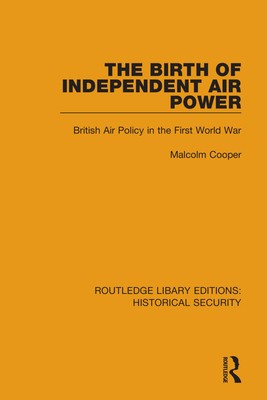
- We will send in 10–14 business days.
- Author: Malcolm Cooper
- Publisher: Routledge
- ISBN-10: 0367634805
- ISBN-13: 9780367634803
- Format: 15.6 x 23.4 x 1.1 cm, minkšti viršeliai
- Language: English
- SAVE -10% with code: EXTRA
Reviews
Description
In forming the Royal Air Force on 1 April 1918, Britain created the world's first independent air service. Britain entered the First World War with less than 200 ill-assorted flying machines divided between the army and the navy, but by the end of the war the RAF mustered almost 300,000 personnel and 22, 000 aircraft. Originally published in 1986, more than 65 years after the event, the decision to form the RAF remained poorly understood and Malcolm Cooper presented the first detailed modern analysis of its creation, shedding new light on the process by which Britain entered the air age.
Set against the background of the build-up of air power during the First World War, the book explains how deepening political concern at failures in home air defence, public demands for retaliatory air action against Germany, problems of mobilization and expansion in the aircraft industry, and disagreements between the existing army and navy air services combined to create the conditions for an independent air force. The author argues that the pressures of war were insufficient to give real substance to the RAF's independence and that its failure to escape from its wartime role as an ancillary service was also of crucial significance in the evolution of British air strategy in later years.
Based on an extensive study of official documents and private papers and amply illustrated with contemporary photographs, this title will prove invaluable in understanding both strategic thinking in the Great War and the early development of a form of warfare which dominated military and naval operations in the twentieth century.
EXTRA 10 % discount with code: EXTRA
The promotion ends in 21d.18:41:13
The discount code is valid when purchasing from 10 €. Discounts do not stack.
- Author: Malcolm Cooper
- Publisher: Routledge
- ISBN-10: 0367634805
- ISBN-13: 9780367634803
- Format: 15.6 x 23.4 x 1.1 cm, minkšti viršeliai
- Language: English English
In forming the Royal Air Force on 1 April 1918, Britain created the world's first independent air service. Britain entered the First World War with less than 200 ill-assorted flying machines divided between the army and the navy, but by the end of the war the RAF mustered almost 300,000 personnel and 22, 000 aircraft. Originally published in 1986, more than 65 years after the event, the decision to form the RAF remained poorly understood and Malcolm Cooper presented the first detailed modern analysis of its creation, shedding new light on the process by which Britain entered the air age.
Set against the background of the build-up of air power during the First World War, the book explains how deepening political concern at failures in home air defence, public demands for retaliatory air action against Germany, problems of mobilization and expansion in the aircraft industry, and disagreements between the existing army and navy air services combined to create the conditions for an independent air force. The author argues that the pressures of war were insufficient to give real substance to the RAF's independence and that its failure to escape from its wartime role as an ancillary service was also of crucial significance in the evolution of British air strategy in later years.
Based on an extensive study of official documents and private papers and amply illustrated with contemporary photographs, this title will prove invaluable in understanding both strategic thinking in the Great War and the early development of a form of warfare which dominated military and naval operations in the twentieth century.


Reviews